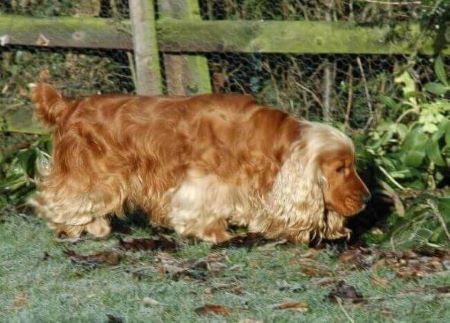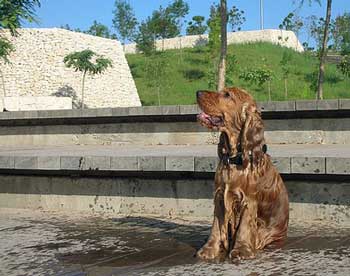- Home
- Grooming a Cocker Spaniel
- Expressing Your Dogs Anal Glands
Expressing Dogs Anal Glands
When dogs anal glands become blocked, you'll soon know about it. You will have a very stinky Spaniel indeed! In addition to the smell, impacted glands can lead to complications causing a lot of pain and discomfort. Learn how to clear your Cocker's anal sacs so that he becomes pain free and smelling sweet again!
Clearing Impacted Anal Glands In Dogs
The job of clearing your dog's anal glands may end up in your lap if your Cocker Spaniel has recurring problems with his anal sacs.
It's not a pleasant job, but someone's got to do it!
Expressing your Cocker's anal glands is fairly straightforward and you can easily do this yourself at home.
However, if after reading the steps below you're still not too confident about the procedure, why not ask your
vet or groomer to show you how it's done for the first time?
Ready?
Okay, but before you begin make sure you have everything you'll need in front of you; a bowl of warm water, a soft cloth, and if you're squeamish, a pair of rubber gloves!
How To Express Your Dogs Anal Glands
Ask a friend or a family member to sit in front of your dog and hold his collar.
Their job will be to speak to your Cocker quietly, stroke him, and generally help to keep him calm (and distracted) while you get behind him and do the business.
 Who's been in my garden!
Who's been in my garden!- Front end taken care of, hold and lift your Cocker's tail.
- Soak the area with warm water and move the fur out of the way to expose his anus. I use a fine, soft cloth for this job but you could use a baby wipe or some cotton wool if you wanted.
- Your dogs anal glands are quite small, about the size of a large pea. You should be able to feel them just under the skin's surface, to the left and right of the anal opening.
- Imagine a clock face; the anal sacs should be positioned where the 4 and the 8 is placed on the clock.
Top Tip: It's a good idea to don a pair of latex gloves before expressing your dogs anal glands as it can get very messy and will be very smelly!
- Once you've found them, using your index finger and thumb, gently push back and upwards and then squeeze the glands together. This gentle squeezing action releases a thick, brownish, unpleasant smelling substance (it smells like rotten fish!).
If you don't manage to express his anal glands, or if your dog seems to be in pain, don't try any further. Simply stop and make arrangements to take him to see his vet.
Top Tip: Stay with your vet and watch him carefully. Ask him to let you try it yourself to make sure you're doing it correctly. Once you've got the hang of it, you'll be able to express your dog' anal glands at home.
Problems Arising With Your Dogs Anal Glands
If your Cocker's blocked glands aren't cleared at the first sign of them becoming impacted they could easily become infected and an abscess may follow. Where an abscess develops, your pet's anus will swell up and turn a dark, angry-looking purple colour, and they can cause your dog a great deal of pain. Ouch!
The abscess will fill with pus, which may occasionally seep from the glands. Your dog won't be able to walk normally; he may walk with his back hunched up and his bottom tucked under.
He'll also try to get relief by dragging his bum across the floor but this can cause further damage his bottom. This 'dragging' is often referred to as scooting and can look quite comical.
From your Cocker's point of view however, it won't seem funny at all because he'll be extremely uncomfortable and probably in considerable pain. You may also notice a lot of frantic bottom-licking in a bid to ease himself.
If you think your dogs anal glands may be infected, don't try and express them or treat the infection yourself.
Similarly, if you suspect your Spaniel has an abscess, don't touch it. Call your vet and make an appointment for your dog to see him as soon as you can. Your vet will lance the abscess and will probably prescribe a course of antibiotics for your pet.
How To Express Your Dogs Anal Sacs
If you prefer to see how it's done for real, this video by Dr Nic at Sydney Pet Vet, but be warned, it's rather gruesome!
Prevention And Treatment Of Anal Sac Problems
If impacted anal sacs aren't too frequent a problem for your Cocker, you can simply clean and clear them as and when the need arises.
 No blocked anal glands here!
No blocked anal glands here!It's a good idea to check your dog's bottom as part of his grooming routine as it will help you to spot a problem and deal with it before it gets out of hand. It's okay to express your dogs anal glands from time to time, but if it becomes a regular thing, it's probably time to speak to your vet.
He may simply suggest increasing the fibre content in your Cocker's diet to help bulk up his stool. (The act of passing a normal, solid poop places the correct pressure on the glands. It's this pressure that helps the glands to express themselves normally; without any help from you).
In cases where the dog suffers from impacted anal glands on a regular basis and where the vet is unable to resolve the problem to his satisfaction, he may recommend that the anal glands are removed surgically, which will eliminate this problem for good.
Summary: Your Dogs Anal Glands:
Impacted anal glands can be painful for your pet and will need immediate treatment to stop things getting worse and his glands becoming infected.
Keep a watchful eye open for those tell-tell signs of scooting and butt licking and include a regular anal check into your Cocker's grooming routine.
If you notice any unusual behaviour suggesting that there may be a problem with your dog's bottom, act quickly before the problem worsens.
Understand more about your dog's anal glands; learn what they do, how to spot the symptoms of blocked or infected glands and you'll be in a much better position to act quickly and stay on top of the problem.


